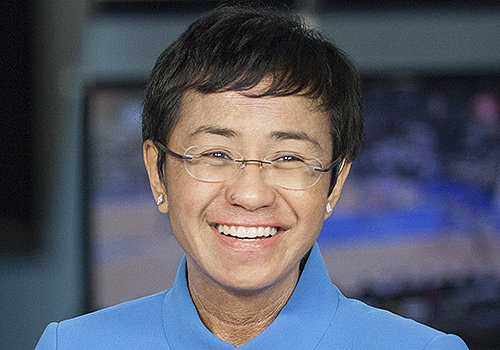“Today, facts win. Truth wins. Justice wins,” Maria Ressa tells the cameras. The Nobel prize winner and CEO of news network Rappler stands outside the court in Manila, after she and Rappler were acquitted of tax evasion charges. As she speaks, she is hit by a wave of emotion — a combination of tears and laughter as the relief takes hold following a four-year court battle.
“These charges were politically motivated, they were incredible to us, a brazen abuse of power, and meant to stop journalists doing their jobs,” she said.
This case has not just been about fighting a dubious accusation from Rodrigo Duterte’s former government in the Philippines, but about free journalism.
“The charges were based on a concocted theory, never before applied in the Philippines, that a news organisation was a ‘dealer in securities’ and had to pay additional taxes that apply only to such bodies,” Caoilfhionn Gallagher KC and Amal Clooney, who represent Ressa’s legal team, said in a statement. Ressa and Rappler had been accused of evading tax payments from foreign investments.
“The case against Ms Ressa was announced just hours after she accepted a prestigious journalism award, and was clearly a political act designed to silence her,” the legal team said.
Even with this victory, Ressa is still facing three more charges, which could carry prison sentences of up to 50 years. The battle is not over. Managing editor of Rappler and Index contributor Miriam Grace A. Go spoke to Index after the court decision.
“In all the cases Rappler faces — all politically motivated and trumped up by the past Duterte government — I’ve always stressed that the persecution, the attack, isn’t just against Rappler,” she said.
“If any government succeeds in crippling or shutting down a fairly big and financially independent newsroom, then it will be easier for them to go after the smaller newsrooms, and even individuals.”
If the ruling had gone the other way, Go said, there would have been far-reaching repercussions, preventing the media from asking hard questions and holding the powerful to account.
“We are just thankful the tax court justices didn’t play along with the past administration’s warped line of reasoning.”
Ressa is now in her fourth decade as a journalist, after starting her career at CNN and eventually setting up Rappler in the Philippines, where she was born. She won the Nobel Peace Prize for her work holding the Duterte government to account — the first journalist to win since 1935 — and joined the judging panel at Index’s 2019 Freedom of Expression Awards. She has even negotiated hostage releases. Her latest book is aptly titled, How to Stand up to a Dictator, where she begins by recounting how the Philippines government issued 10 arrest warrants against her in fewer than two years. She writes, “The breakdown of the rule of law is global, but it had become, for me, personal.”
Ressa explains in her book that she is targeted online every day, with online violence spilling into real-world violence: “In 2018, I began wearing a bullet-proof vest on the road.”
In 2018, Go wrote about attacks on the Rappler newsroom from President Duterte. She described how the president himself ordered a ban on one of their reporters, Pia Ranada, entering the presidential compound. That ban extended to Ressa. Just months after Duterte won the 2016 election, Rappler had a body of evidence showing the “administration was engaging in systematic disinformation.” Ressa was targeted with personal attacks online, as were other staff members.
“There was one time when a proclaimed Duterte supporter got a photo of our office building on Google Maps and posted it, telling other diehard supporters of the president that this was where they should go in order to harm Rappler employees,” Go wrote.
The attack on Rappler had begun, and what followed was a slew of cases filed against the company, an attempt to revoke its licence and reporters being turned away from press conferences. Rappler was singled out again and again, but global media organisations stood together in solidarity.
“The administration may think that it can slow us down with these distractions – yes, the cases are distractions – but what it didn’t realise was that, by targeting Rappler, it had roused a bigger enemy. #StandWithRappler has quickly given way to #DefendPressFreedom,” said Go in the article.
Today’s victory is felt just as keenly by human rights organisations, journalists and readers around the world, who stand with Ressa and Rappler, and who speak up for press freedom.
Go told Index today: “I had Rappler readers messaging me today, “We won!” Did you read that — WE. They consider this their victory. How can we drop what we’re doing if these people are, as we say, holding the line with us?”






